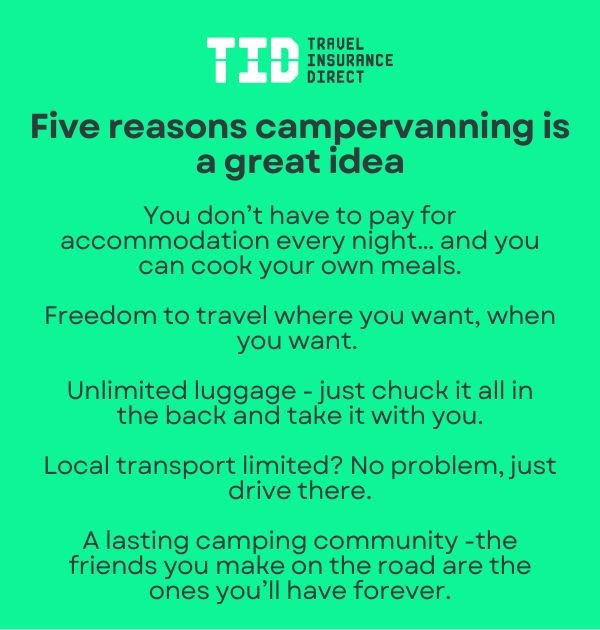Reading time: 5 minutes


Spontaneity and the freedom to change course on a whim are perhaps the most liberating aspects of exploring a new destination by road.
Whether you're planning on taking a slow trip through New Zealand with its world-renowned wineries, skiing and adventure activities, or prefer to country-hop through Europe, campervanning can be a great way to do it.
But before you head off, it's worth doing a little bit of planning so that campervan adventure stays on course.
And if you do plan a campervan trip to travel slow, it's worth considering travel insurance, as a policy can be useful if the wheels fall off your road adventure.
What to consider when campervanning overseas
- Size does matter: Many travel insurance policies don't cover hire vehicles (4-wheeled) with a gross vehicle mass more than 4.5 tonnes and your licence might also be limited to a lower weight, meaning it might not be legal for you to drive in that country. Check before you go.
- Are we talking kilometres or miles? No matter where in the world you're planning on journeying, you should always keep a track of the local speed limits… and what they're signed in. Travelling at 100 miles an hour only to find the speed limit is 100 kilometres per hour can be costly.
- Road rules: Always important – and always different between countries. Common things travellers are caught out on include merging, whether to stick left or right, and unusual rules like (i.e. – in the US you are always allowed to turn right at a red light if you are free to do so).
- Tolls and getting around: Consider any tolls you may pass through and how you may need to pay for them; and make sure you think about getting around – we all know how expensive international data can cost so get your hands on a map in advance, download the map to your device or hire a vehicle with an inbuilt GPS.
- Make sure you stay classy: Licence wise we mean - you'll need to do your homework to ensure you have the correct driver's permit. You'll also need it for your travel insurance and in many European countries you'll need an international licence as well as your Australian licence.
- Campervan Safety: From a practical and liability point of view, it's important to keep your vehicle always locked, especially when parked, and at fuel stations and traffic lights - thieves are opportunistic everywhere. Your travel insurance policy may not cover you if you leave doors unlocked or keys in the ignition, same goes for injuries sustained if you're not adhering to the road rules or you're not wearing a seat belt - it's considered negligent and reckless.
Driving in NZ
When it comes to New Zealand, Aussies can drive here no problem, but any traveller with a driver's licence in a foreign language, for whatever reason, will need to have it translated or have an international driving licence. Do check this before you go as this may not be accurate at your time of travel.
Be prepared for unexpected road hazard
For example while renting a car in New Zealand is like renting in Australia, you need to be mindful of other hazards such as sheep and cattle which can blocks roads for hours. Be prepared to stop suddenly as you never know what is around the corner.
Planning a slow campervan trip around Europe?
Many of our TID travellers like to take Europe slow in a campervan, as there's just so much of it to visit. There's a couple of things you should know about campervanning in Europe when you're planning.
- When hiring a vehicle in Europe, check that the agreement allows you to cross borders. Some companies will charge you extra for this, and at times vignettes are required - stickers indicating you have paid the relevant highway taxes.
- A Green Card is a cross-border insurance card that proves that you have the minimum level of insurance required, and while most countries don't require this, but places like Bosnia, Herzigova, and Montenegro do, so keep it in mind.
And, a biggie, remember they drive on the opposite side to us; roads can be quite narrow; and concentration is always required, particularly when you're tired.
Understanding rental car insurance versus travel insurance
Driving in another country isn't something to be taken lightly, which is why renting a vehicle overseas requires plenty of planning ahead. It's important to know that there is a difference between the coverage of a travel insurance policy and the insurance a hire company may offer.
Car rental companies offer a range of insurances – they can vary from a small extra to cover your windshield to more extensive cover in case you're involved in a crash. They tend to only cover events related to the rental campervan or care hire and mostly don't cover extras like medical if you're hurt.
Travel insurance tips for when campervanning
Did you know having travel insurance can save you money on your rental! Many policies such as TID's The Works, The Basics and Annual Multi Trip Plans automatically include rental vehicle insurance excess coverage up to the benefit limit. To be eligible you must take out insurance for the vehicle with the rental car hire company, however you then may not need to pay more to reduce your excess, or it may cover your excess payment if there's an accident and your campervan is damaged. Read the PDS for the full terms, conditions, limitations and exclusions.
You'll also be grateful for travel insurance if your van veers off the road, you're injured and require emergency medical attention; the motorhome gets broken into and your phone is stolen; or there are unexpected delays that prevent you returning the vehicle on time.
TID offers 24/7 emergency assistance which can help you navigate medical incidents and find consulate details if you're not sure who to call for help.
This is a brief summary of cover only and does not include the full terms, conditions, limitations and exclusions. Read the PDS before purchasing.